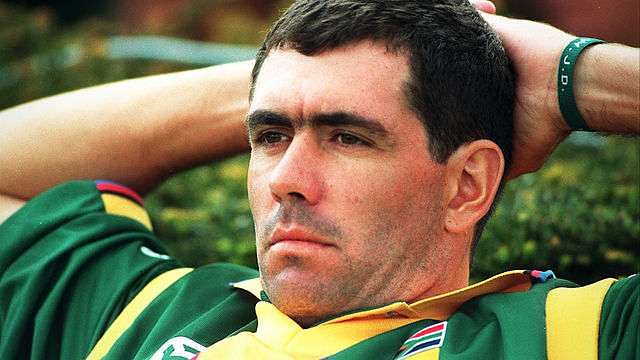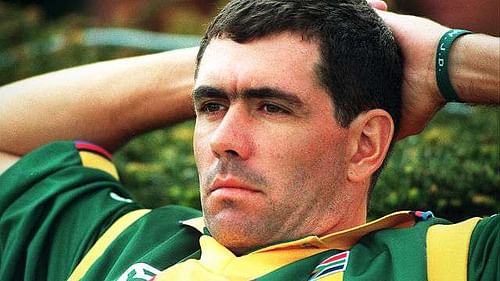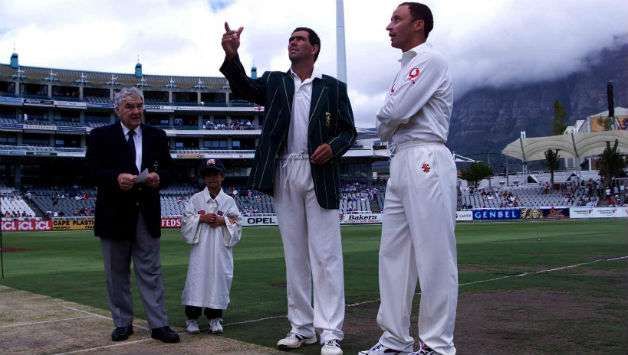
Fixed! A scandal that rocked the game
The Day is April 7, 2000.
The Delhi Police charge South African skipper Hansie Cronje with allegations of fixing the one-day matches played against India in March earlier that year. In support of the allegations, Delhi Police release transcripts of an alleged conversation between Cronje and an Indian businessman, alleged to be a bookie, by the name of Sanjay Chawla.
The transcripts also mention Cronje’s teammates Gibbs, Strydom and Boje – are they playing, have they agreed to the deal and so on.
Charges are also filed by the police against two Indians, Sanjay Chawla and another Delhi-based businessman Rajesh Kalra, who is arrested. Sanjay Chawla is reported to be in London at the time. New Delhi Additional Commissioner K. K. Paul states that they would seek the help of Interpol as a ‘huge international crime had been committed’.
In Johannesburg, United Cricket Board of South Africa (UCBSA) chief Ali Bacher immediately comes to Cronje's defence. He mentions Cronje’s ‘unquestionable integrity and honesty’, and says that he is convinced there is no substance in the reports from India. Cronje himself issues a statement saying that he is stunned at the allegations which he calls are ‘completely without substance’.
Aziz Pahad, Deputy Minister of Foreign Affairs, assures Ali Bacher that the government would seek an explanation for reports that South African players' telephones were tapped while on the tour of India and also regarding the process by which the allegations against the cricketers were made public by the Delhi Police.
The entire cricketing fraternity in South Africa rallies behind Hansie Cronje. The authorities also claim that the voice alleged to be Cronje’s in the conversation in the tapes does not have a South African accent. While the allegations are rubbished by all and sundry in South Africa. Former skipper Kepler Wessels, while still doubting the allegations, does call for an independent inquiry into the allegations saying ‘the biggest mistake we could make would be to try and sweep it under the carpet without an investigation.’
On April 9, Hansie Cronje once again denies match-fixing allegations at a news conference in Durban. He goes on record to say, ‘I want to make 100 percent clear that I deny ever receiving any sum of money during the one-day series in India. I want to also make it absolutely clear that I have never spoken to any member of the team about throwing a game.’ He says that he believes match fixing has no place in sport and that he is ‘hurt’ at the allegations. Gibbs and Boje also attend the press conference and back Cronje's story and say neither of them had received any offers to fix matches.
Back in India, Delhi police sends investigators to three Indian cities - Mumbai, Bangalore and Kochi - to widen the net to nab the bookies, and seeks Interpol's help in tracking down Sanjay Chawla.
On April 10, the Indian police declare it now has ‘clinching’ evidence to substantiate the match-fixing charges against Hansie Cronje. New Delhi Crime Branch chief Pradeep Srivastava says he has proof that Cronje was in contact with Sanjay Chawla during the five one-day internationals played in India between March 9 and 19. The CBI says that a request would be forwarded to Interpol soon to obtain voice samples of South African skipper Hansie Cronje and Sanjay Chawla to authenticate the taped conversations between the two allegedly involved in the match-fixing scandal.
In Chennai, the then BCCI president AC Muthiah says he will react to the charges of match fixing only after the particulars are made available by the authorities later in the month on 28-April.
In the meantime, the Australian cricket team is about to leave Sydney for South Africa. On April 11, in an interesting turn of events, UCBSA announces that Hansie Cronje has withdrawn from the three match one-day series against Australia commencing on April 12. Shaun Pollock is appointed the new captain. The UCBSA sacks Hansie Cronje after he admits he has been ‘dishonest’ with the board over his activities during the series in India, says Ali Bacher. Hansie Cronje acknowledges he received 10,000 to 15,000 dollars during the one-day series in India for sharing information, but he continues to deny being a part of any kind of match fixing.
However, Hansie Cronje denies that he had received money in India minutes after Ali Bacher’s statement. In his own statement issued in Cape Town, Cronje says he never received ‘financial rewards’. However, UCBSA maintains the position that Cronje's contract with the UCBSA has been suspended and he will not receive a salary at the end of April.
Deputy Foreign Minister Aziz Pahad tells reporters that the cabinet is keen to set up a judicial commission of inquiry into the scandal as soon as possible. It is decided that, the controversial fifth Test between South Africa and England in January that year will also form part of the inquiry into match-fixing allegations against Hansie Cronje. The Test at Centurion Park in which both teams agreed to forfeit an innings after three days of rain was won by England by two wickets with five balls to spare. It was at Cronje's suggestion that both captains forfeited an innings to make it possible to avoid a draw.
‘The Star’ makes a breakthrough at this time!
It names a mysterious South African agent Hamid `Banjo' Cassim, a Johannesburg businessman and friend of Cronje with links to Indian cricketers. The Star says that Cassim is the linkman between Cronje and the London-based Indian businessman Sanjiv Chawla.
South African cricketer Herschelle Gibbs, originally named in the match-fixing scandal, says he is relieved to have been cleared of any wrongdoing by Hansie Cronje. The sacked South African captain earlier said that no other member of the side had done anything wrong.
Hansie Cronje hints that his cricketing career is over. In a statement read out in his lawyer's office, he says ‘I am truly proud to have been associated with this side and wish Shaun and the rest of the team nothing but success in the future. All I will say is that I was not involved in fixing or manipulating the results of cricket matches. I always played to win. I know of no member of any side that I have led who has done anything reprehensible or wrong. I find myself in an awful predicament brought about by my own foolishness and naivety.’
Around the same time, in a startling revelation, former South African coach Bob Woolmer claims that the team was offered 250,000 dollars to fix a match during South Africa's 1996 tour of India. According to a report in the Daily Sport newspaper in London, Woolmer said that the entire squad got together and vowed not to get involved with those trying to get in touch with them. This immediately brings to light the fact that the roots of match fixing in the subcontinent run deep and date back to the 90’s.
On 15-April, the police make a breakthrough in India. Federal revenue officials arrest Kishan Kumar, a former actor, on charges that he was one of the links between arrested bookie Rajesh Kalra and his business associate in London, Sanjay Chawla.
Kishan Kumar, who is arrested in a hospital where he is undergoing treatment for reported cardiac problems, has not been moved from his bed because of his poor health, according to doctors. Police detectives say that Kishan Kumar's arrest is also part of an ongoing probe aimed at unearthing links between bookmakers and India's underworld in match fixing. Intelligence sources in India also say that another suspect in the match fixing scandal is Anees Ibrahim, the brother of underworld kingpin Dawood Ibrahim.
Indian Sports Minister Sukhdev Singh Dhindsa says he has asked for the report of the Chandrachud Committee on match fixing to go through it personally and maybe even make it public. Former Indian cricketer Manoj Prabhakar challenges Justice Chandrachud's claim that the cricketer declined to reveal the names of Indian players involved in match fixing. Prabhakar says he is ready to identify them if the government provides him with necessary support.
Later, Dhindsa tables in Parliament the Chandrachud report into allegations by Manoj Prabhakar that some of his teammates fixed matches. According to the report, Chandrachud labels Prabhakar's allegations as ‘imaginary and unrealistic’. While finding no evidence of match fixing by Indian players and officials, the report does say that illegal betting on matches does take place in India.
As India collaborates strongly with the UK on the match-fixing scandal, reports quoting The Sunday Times in London say that Scotland Yard is in touch with Indian police over the investigations in the match-fixing racket. Media reports from London say that England captain Nasser Hussain will be asked to give his testimony to the judicial inquiry in South Africa following new allegations against Cronje on the rain-hit fifth and final Test between the two countries in January. Hussain has maintained that there was nothing improper about the circumstances that led to England's thrilling victory after both sides had forfeited an innings in the rain-washed test on Cronje’s suggestion.
Later that year, in June 2000, in his testimony before the King Commission Hansie Cronje finally acknowledges that he lied again and again. He says, ‘My initial denials of involvement made publicly to the United Cricket Board of South Africa were untruthful; my letter of April 11 was also untruthful in a number of respects, and so too was the subsequent press statement issued on my instruction. I misled the UCBSA and members of the South African Government... I also withheld facts form my legal representatives. I was not honest, and I apologise unreservedly.’
In his testimony, he then makes revelations that shakes the very foundations of India’s cricket history.
More about it in the next and concluding episode.
Sourabh Mukherjee is the author of the bestselling thriller ‘In the Shadows of Death: A Detective Agni Mitra Thriller’ published by Srishti Publishers and ‘Romance Shorts’ a collection of dark romance short stories.

